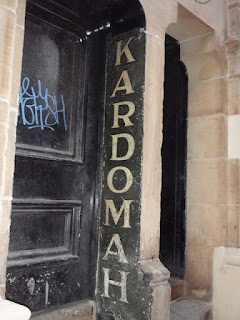Over the summer, Manchester Modernist Society put me in touch with a new acquaintance called Bill Mather, and suggested his father, Roy Mather, might be willing to share some of his memories of working as a 'Hobart Man' in mid-century Manchester and Cheshire. I travelled to his home in Stretford to meet Mr Mather, and the following is based on our conversation.
When Roy Mather joined the Manchester branch of Hobart in 1945, as a service engineer maintaining automated, labour-saving devices such a mixers, dishwashers, mincers, potato peelers and coffee machines, it was the start of a four decade career that gave him a behind the scenes view of how Manchester lived, worked and played as it emerged from the rationing and austerity of the war years to become a swinging modern city.
Like many of his generation, Mr Mather left school at 14. He spent two years at Lewis's department store on Market Street before joining Hobart, a working life which immersed him in the city's social life. 'The Hobart Man', as he was known, made regular maintenance calls to canteens, bakeries, butchers, grocery shops and coffee bars (and even Strangeways prison – anywhere that provided catering on a large scale). One chain Mr Mather remembers particularly well was Kardomah, which started in Liverpool and had branches in various other cities in the UK and internationally. Kardomah had a presence in Manchester at Albert Square, Market Street and Market Square. The art deco-style Market Street branch, illuminated with neon signs, was a glamorous sight, designed by the prominent industrial designer Sir Misha Black, and Mr Mather remembers that Kardomah was a popular meeting place, serving thirsty shoppers an exotic and sophisticated range of coffees, as well as live music.
These were the days of mass employment at places like Trafford Park. Cheap lunches – the main meal of the day – were provided to workers in huge canteens, and workers socialised together when the day was done at working clubs. The Hobart Man was a regular visitor to companies such as Kellogg's, Brown & Polson and AIG (later GEC/Metropolitan Vickers), which had bases in Trafford Park, making sure the giant mixers, potato peelers and dishwashers were running smoothly.
Nearby, the busy Manchester Docks were still filled with big Manchester liners with names like Manchester City and Manchester Renown, which sailed as far as Canada. The Hobart Man serviced equipment in the ships' galleys; one memory which makes Mr Mather laugh is leaving a ship's galley with the machinery in bits, with the intention of getting spares and returning the next day, but climbing onto an identical-looking sister ship instead and having to jump off when the ship started moving. He reflects that this was a dangerous thing to do as, “in those days, if you fell in you wouldn't live long there was so much pollution”.
Initially, Hobart had a showroom and offices at 97 Oxford Road, Chorlton-on-Medlock, in between a shoe shop and a Boosey & Hawkes shop which repaired musical instruments (this was taken over for the production of aircraft parts during the war, Mr Mather remembers). There was a workshop in the basement and a philosophical society on the floor above. The premises was later demolished to make way for Manchester's highway in the sky, the Mancunian Way, and the street would be unrecognisable to today's the Hobart Man. Now the heart of student land, lined with takeaways and university buildings, Oxford Road and Oxford Street once had a reputation as being Manchester's entertainment streets, home to several cinemas and picture houses. Mr Mather also recalls calling on a number of restaurants when it still was a bustling high street, including the Palace Restaurant, next to the Palace theatre, and the Prince's restaurant on the corner, as well as Lyons cafe and Duncan & Foster, which had a restaurant at All Saints and bakeries on York Street.
At first, The Hobart Man had to carry his tools on the bus or the tram. Tyres were among the goods which had been rationed during the war, and a shortage of vans in the 1950s meant it wasn't until later that Hobart staff got Escort vans. Hobart moved on to Redgate Lane in West Gorton, and Mr Mather was allocated a 'patch' covering Stretford, Sale, Altrincham and South Cheshire – as far as Crewe and Nantwich. In the days of a reliable and predictable postal service, instructions were sent through the post each morning with the day's jobs. He recalls: “Every day was different. You didn't know where you'd be going in the morning.” There was a certain freedom, and Mr Mather made sure to time his jobs to where he knew he would be offered the best lunch! He also put his local knowledge of the roads to good use at the weekends, going on cycling trips around Cheshire with other members of Hobart staff and the then-burgeoning Youth Hostel Association.
One of many other perks to the job was being given a 'wrap' to take home after a maintenance visit – a bit of meat, perhaps, some sausages, cake, or a bag of sugar or flour (remember, rationing of sugar and sweets, introduced during the war, continued until 1953, and meat until 1954). Mr Mather's children still recall the excitement of him bringing liquorice and blackcurrant toffee home from Benson's sweet factory in Bury every July when the factory shut down and The Hobart Man was allowed access to the staff shop.
Hobart closed its Manchester branch in 1982, amalgamating with the Liverpool branch and moving to Widnes then eventually to Warrington. The company introduced pagers to notify staff of jobs, meaning that The Hobart Man no longer had the level of freedom enjoyed by Mr Mather earlier in his career. However, Mr Mather has fond memories of his time as a Hobart Man and still wears the engraved gold watch that was presented to him in 1970 to commemorate twenty years of service. Mr Mather's might seem an ordinary career, yet you could call him a flaneur, a wandering observer for the modernist era; his everyday memories bring to life Manchester's forgotten streetscapes and working history in ways that mere photographs could not.
With thanks to Roy Mather for sharing his memories, and his son Bill.
There wasn't space for this article to fit into the modernist magazine's forthcoming 'Cuppas' edition but the new issue, which will be packed with more cafeteria and cafe themed writing, is launched next Thursday at North Tea Power.
Saturday, 1 December 2012
The Hobart Man: life as a travelling service engineer
Labels:
Bury,
cafes,
Cheshire,
Food,
History,
Hobart,
Kardomah,
Manchester,
Modernism,
Modernist Society,
Salford,
social history,
Trafford Park,
Travel
Subscribe to:
Post Comments (Atom)





No comments:
Post a Comment